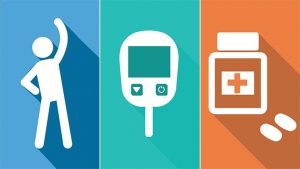New Year – New Goals. Let Your Pharmacist Help You.
Alan Tanabe/ January 8, 2019/ Medication Management, Self management/ 2 comments
Happy New Year, everybody! I hope that the new year has started well for everyone.
New Year’s Resolutions
With the arrival of a new year comes the age-old practice of making resolutions. “I will lose weight this year.” “I will quit smoking this year.” “I will exercise one hour everyday this year.” “I will get my diabetes/blood pressure/asthma under control this year.” Of course, not everybody makes new year’s resolutions, but many of us can benefit from setting goals to improve our overall health.

Setting Goals to Challenge and Succeed
How many times have you set a personal goal like the ones mentioned, only to fall short of achieving that goal? Statistics suggest that most of us have experienced that disappointment. Be assured, it does NOT mean that you are a failure. Perhaps you didn’t do a complete assessment of how to successfully reach your goal. Perhaps you did not have a strong support system to help you reach your goal. This is not to suggest that it is better to set goals that do not challenge you and can be achieved with minimal effort. It is healthy to have goals to challenge you and get you out of your comfort zone, but I do not recommend setting goals that you do not believe to be realistic (e.g. losing 10 pounds per week) and then experiencing great disappointment and lack of motivation to continue working toward your goal. Instead, I recommend the SMART approach to setting and working toward goals. SMART stands for:
S- Specific. Instead of setting a general goal such as “I will lose weight,” try setting a more specific goal such as “I will set a goal to lose 1 pound per week” (which is considered to be a healthy rate of weight loss for most people).
M – Measurable. Set goals that can be specifically measured so you can see your progress. As a bonus, it gives you reason to celebrate each little victory achieved!
A – Attainable. Set goals that you believe that you can attain. Keep in mind, these goals can be adjusted as you continue your efforts. For example, a healthy goal for most adults is to achieve at least 30 minutes of aerobic activity daily for 5 days each week. However, if you have been very physically inactive for a long period of time, or have some degree of physical limitations, it is fine to set a lower goal initially (e.g. 15 minutes per day 3 days per week) and work your way up as you tolerate it.
R- Realistic. Again, keep your goals realistic based upon your motivation, abilities, resources, and other factors. For example, it would likely be considered unrealistic for most people to set a goal to lose 30 pounds per month, or to expect to run in a marathon this year prior to any training. However, it would be considered much more realistic to set a goal of increasing the amount of daily steps that you take.
T – Time related. To keep yourself on track of achieving your goal(s), make them time related. For example, if you wish to quit smoking, set a target quit date instead of waiting for sudden inspiration to take action.
How can my pharmacist help?
First, learn where to get help with your medications. While all pharmacists are working to help you in various ways, certain pharmacists have additional training and experience focusing on helping patients optimize their medications. In addition, some pharmacies are contracted with certain insurances to provide these services, while others are not. Here are some examples of how a pharmacist can help you achieve your health-related goals; some of which require very little effort on your part:
–Schedule a comprehensive medication review with your pharmacist. Your pharmacist can review your medications (prescriptions, non-prescriptions, supplements, etc…) to assess if your medications are being used optimally to help you achieve your health-related goals. We can work with you regarding addressing potential barriers in achieving your goals (e.g. financial barriers, confusing instructions, opportunities to reduce the number of medications, etc…). If your usual pharmacist does not offer these services, I highly recommend contacting Betty Chaffee, PharmD. at BetterMy Meds.
–Have your pharmacist assess your vaccination records. Your pharmacist can help determine if you are due or overdue to receive certain vaccinations to reduce your risk of certain diseases. For example, in the state of Michigan, there has been an increase in reported cases of hepatitis A and pertussis (whooping cough).
–Know your status regarding certain diseases. Your pharmacist may have been trained to perform certain point-of-care tests to help determine your status for certain diseases. For example, baby boomers, certain health professionals, anyone having received a blood transfusion, and others are considered to be at higher risk for hepatitis C. Knowing your status is important not only for reducing the risk of spreading diseases, but also in determining the need for treatment.
–Working with you to achieve your goals. Your pharmacist can work with you to develop a personalized plan to help you quit smoking, can recommend ways to improve blood pressure and diabetes control, can help educate you in monitoring your progress, and many more services!
Wishing each of you a happy and healthy new year!


Alan, This post is super helpful! Thank you
I’m glad to hear that you find this information helpful, Diep. Thank you for commenting!